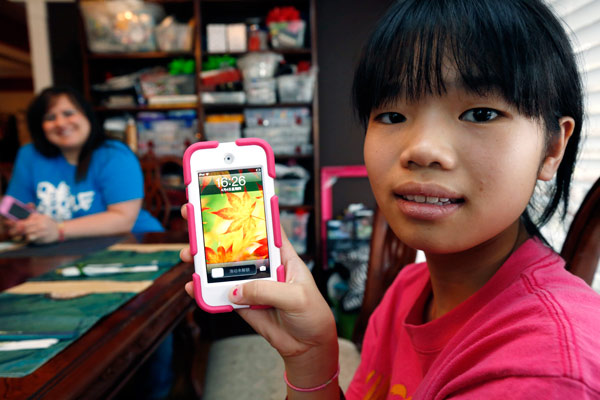Online translator breaks down language barriers
Updated: 2013-04-08 08:04
(China Daily/Agencies)
|
|||||||||||
You might use Google Translate to read a hard-to-find manga comic book or decipher an obscure recipe for authentic Polish blintzes. Or, like Phillip and Niki Smith in Mississippi, you could use it to rescue a Chinese orphan and fall in love at the same time.
Google is now doing a record billion translations a day, as much text as you'd find in 1 million books for everything from understanding school lunch menus to gathering national security intelligence. It translates in 65 languages, from Afrikaans to Yiddish, and can be used with speech recognition and as an app on mobile phones, even if there is no online connection.
 |
|
Guan Ya Smith, 14, who is deaf, shows off her iPod that allows her to communicate with her new adoptive family through Google Translate. Phillip and Niki Smith (background) and their three other children in Rienzi, Mississippi, use the program to speak with Guan Ya. Rogelio V. Solis / Associated Press |
While the technology is exponentially evolving, Google's translation guru Franz Och's face lit up when he heard that the Smiths and their new daughter, 14-year-old Guan Ya, are settling into their new lives together this month, communicating almost exclusively through Google Translate.
"All day long I look at algorithms, algorithms and algorithms," he said. "It is so rewarding to hear that it is touching lives."
In the Smiths' case, it changed theirs forever.
The Smiths, who already had three children, first spotted Guan Ya less than a year ago when Niki Smith was looking at photos of hard to place orphans online, offering simple prayers for them one by one. With three children of her own, including a 3-year-old daughter adopted from China, she had no intention of adding to her family.
Then she saw Guan Ya.
"She was just our daughter," said Smith of that chance Internet encounter nearly a year ago. "There was no doubt about it, from the first time we saw her on the Internet."
There were seemingly impossible obstacles to adopting the girl. First, Guan Ya was months away from turning 14, the age at which Chinese law would make her ineligible for adoption. Not only could Guan Ya not speak English, she didn't speak at all.
Guan Ya is deaf.
Undeterred, the Smiths scrambled through the paperwork and home studies that are inherent to international adoptions. With support from Chinese and US authorities, they expedited the bureaucracy by running a flurry of e-mails and forms through online translators. And one day Niki Smith received an e-mail from her daughter-to-be, an unintelligible jumble of Chinese characters.
"Well, I couldn't begin to read this letter," said Smith.
That is where Google Translate came into play. Smith cut and pasted the letter into the empty rectangle for the program in her Internet browser and Guan Ya's thoughts magically appeared.
Thus began their heartwarming virtual conversation of love, family and life.
"The computers and software are tools, but I have no doubt that these tools made our bonding so much easier," said Niki Smith.
Associated Press in Mountain View, California
Related Stories
Wearing translator's hat a big role 2013-03-08 07:34
Translations distort the reality 2013-02-22 07:15
Projects to promote Chinese writers 2013-01-31 09:00
The fantastic five of best-selling translated works 2013-01-22 04:11
Today's Top News
Police continue manhunt for 2nd bombing suspect
H7N9 flu transmission studied
8% growth predicted for Q2
Nuke reactor gets foreign contract
First couple on Time's list of most influential
'Green' awareness levels drop in Beijing
Palace Museum spruces up
Trading channels 'need to broaden'
Hot Topics
Lunar probe , China growth forecasts, Emission rules get tougher, China seen through 'colored lens', International board,
Editor's Picks

|

|

|

|

|

|





